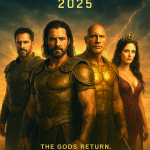The Family Man (2000) – A Heartwarming Tale of Love, Choices, and Second Chances

The Family Man (2000) – A Heartwarming Tale of Love, Choices, and Second Chances
Directed by Brett Ratner and released on December 22, 2000, The Family Man is a romantic drama infused with a festive Christmas spirit. Starring Nicolas Cage as Jack Campbell, Téa Leoni as Kate Reynolds, and Don Cheadle as the enigmatic Cash, the film serves as a modern-day reimagining of Frank Capra’s classic It’s a Wonderful Life. At its core, The Family Man explores the timeless question of “what if?”—a poignant meditation on the roads not taken, the power of love, and the possibility of second chances. With its blend of humor, emotion, and holiday charm, the movie remains a beloved gem that resonates with audiences seeking both entertainment and introspection.
Plot Overview: What If Life Had Been Different?
The story begins with Jack Campbell (Nicolas Cage), a wealthy, high-powered Wall Street executive living a fast-paced, glamorous life in New York City. At 35, Jack has it all: a sleek penthouse apartment, a Ferrari, designer suits, and a reputation as a ruthless dealmaker. Yet, beneath the surface of his success lies a void—he’s unmarried, unattached, and emotionally distant. His life is a monument to ambition, built on the sacrifice of personal relationships, including a pivotal choice 13 years earlier to leave his college sweetheart, Kate (Téa Leoni), for a lucrative career opportunity in London.
On Christmas Eve, Jack’s world takes an unexpected turn. After a late-night stop at a convenience store, he intervenes in a tense altercation involving a mysterious stranger named Cash (Don Cheadle). Cash, who exudes an otherworldly aura, questions Jack’s values and hints at a cosmic shift. Dismissing the encounter as odd but inconsequential, Jack returns home—only to awaken the next morning in a reality he doesn’t recognize.
In this alternate life, Jack is no longer the polished tycoon. Instead, he’s a middle-class family man living in suburban New Jersey, married to Kate, and father to two young children: Annie (Makenzie Vega) and Josh (Jake and Ryan Milkovich). He works a modest job at a tire shop owned by Kate’s father, drives a minivan, and navigates the chaos of diaper changes and school drop-offs. Initially horrified and disoriented, Jack assumes this is a nightmare or a prank. He storms back to New York, demanding answers, only to discover that his old life—his penthouse, his Ferrari, his corner office—has vanished. No one recognizes him as the corporate titan he once was.
As days turn into weeks, Jack reluctantly adapts to this unfamiliar existence. He stumbles through suburban routines, from bowling nights with friends to bedtime stories with Annie, who quickly becomes his anchor. Through Kate’s unwavering love and the innocent affection of his children, Jack begins to see the beauty in this simpler life. The tire shop, once a symbol of failure in his eyes, reveals a quiet dignity in honest work. The contrast between his former wealth and this newfound warmth forces Jack to confront a profound dilemma: Is this glimpse into an alternate reality a punishment, a gift, or a chance to rewrite his destiny?
The narrative builds toward a bittersweet climax. Just as Jack fully embraces his role as a husband and father, Cash reappears, revealing that this life was temporary—a “glimpse” meant to teach him something. Jack pleads to stay, but he awakens back in his original reality, alone in his penthouse on Christmas morning. Heartbroken yet transformed, he tracks down Kate, who in this timeline is a successful lawyer preparing to move to Paris. In a desperate, emotional plea, Jack tries to convince her to give their long-lost love a second chance. The film ends on an ambiguous yet hopeful note, leaving viewers to wonder whether Jack can reclaim the family life he came to cherish.
Themes & Emotional Depth
The Family Man weaves a rich tapestry of themes that resonate universally, making it more than just a holiday movie. At its heart is the tension between love and ambition. Jack’s initial life epitomizes the American Dream—wealth, power, and independence—but it comes at the cost of loneliness. His alternate reality, while less glamorous, offers a different kind of richness: emotional connection, purpose, and belonging. The film doesn’t vilify ambition but suggests that true fulfillment lies in balance, a message that speaks to anyone wrestling with career-versus-family priorities.
Another key theme is the value of family. Jack’s journey from a self-absorbed bachelor to a devoted father and husband underscores the quiet joys of domestic life. Scenes of him shoveling snow with Annie or laughing with Kate over a spilled pizza humanize him, revealing what he’s missed in his pursuit of success. The suburban setting, often mocked in his old world, becomes a haven of authenticity and love.
The film’s Christmas fable framework adds a layer of enchantment. Like A Christmas Carol or It’s a Wonderful Life, it uses the holiday season as a backdrop for transformation and redemption. Cash, with his sly grin and cryptic wisdom, serves as a guardian angel figure, orchestrating Jack’s journey with a mix of mischief and compassion. The snowy streets, twinkling lights, and festive cheer amplify the story’s emotional stakes, framing it as a modern miracle.
Finally, The Family Man taps into the universal concept of the road not taken. It invites viewers to reflect on their own “what if” moments—missed opportunities, abandoned dreams, or relationships left behind. Jack’s dual lives act as a mirror, prompting introspection about the choices that define us. This existential depth elevates the film beyond a simple rom-com, making it a poignant exploration of identity and regret.
Cinematic Style & Performances
Brett Ratner’s direction strikes a delicate balance between comedy, drama, and sentimentality, ensuring The Family Man never feels overly saccharine. The cinematography, led by Dante Spinotti, contrasts Jack’s two worlds vividly. His Wall Street life is shot in cool, sterile tones—glass skyscrapers and sleek interiors reflecting his isolation. In New Jersey, warm hues dominate: golden lamplight, cozy homes, and snow-dusted lawns create an inviting, lived-in feel. This visual dichotomy reinforces the emotional shift Jack undergoes.
The soundtrack, composed by Danny Elfman, enhances the film’s sentimental tone. Elfman’s orchestral score swells during tender family moments, while classic holiday songs like “Let It Snow” and “Jingle Bells” infuse scenes with seasonal nostalgia. The music acts as an emotional guide, subtly nudging viewers to feel Jack’s evolving heart.
The performances anchor the film’s success. Nicolas Cage delivers one of his most underrated roles, blending his trademark intensity with vulnerability. Early on, Jack’s arrogance and bewilderment are palpable—he’s a fish out of water, barking orders at bewildered tire shop employees. As he softens, Cage reveals a tender side, his wide-eyed wonder at fatherhood and love grounding the film’s fantastical premise. His chemistry with Téa Leoni is electric. Leoni’s Kate is the soul of the story—warm, witty, and fiercely loyal. She makes Kate relatable yet aspirational, a woman who chose love over ambition and thrives in her choices. Their scenes together, whether bickering over laundry or sharing quiet glances, radiate authenticity.
Don Cheadle steals every scene as Cash, the enigmatic catalyst for Jack’s transformation. With minimal screen time, Cheadle imbues Cash with a mix of menace, humor, and wisdom, suggesting a supernatural force at play without overexplaining it. Supporting players, like Jeremy Piven as Jack’s wisecracking friend Arnie and Makenzie Vega as the precocious Annie, add humor and heart, fleshing out the suburban world.
Cultural Impact & Reception
Upon release, The Family Man grossed over $124 million worldwide against a $60 million budget, a modest success. Critics offered mixed reviews—some praised its emotional resonance, while others found it formulaic. Roger Ebert gave it three stars, calling it “a movie that grows on you,” while Variety noted its “sentimental sweetness.” Over time, it has gained a cult following, especially as a holiday staple alongside films like Home Alone and Elf.
The film’s enduring appeal lies in its relatability. In an era of dot-com booms and corporate excess, The Family Man offered a counterpoint—a reminder that wealth doesn’t guarantee happiness. Its message feels even more relevant today, as debates about work-life balance and societal priorities persist. Viewers return to it not just for nostalgia but for its quiet wisdom.
Final Verdict
The Family Man is a heartfelt, thought-provoking blend of romance, drama, and holiday magic. While it treads familiar “alternate reality” territory, it distinguishes itself with genuine emotion, stellar performances, and a timeless question: What truly matters? It’s a film that warms the heart without preaching, inviting us to cherish the people we love over the things we own.
Perfect for a cozy holiday watch or a reflective evening, The Family Man reminds us that second chances—whether real or imagined—can inspire us to live more fully in the present. As Jack Campbell learns, success isn’t measured by a bank account, but by the laughter, love, and legacy we share with those around us.











